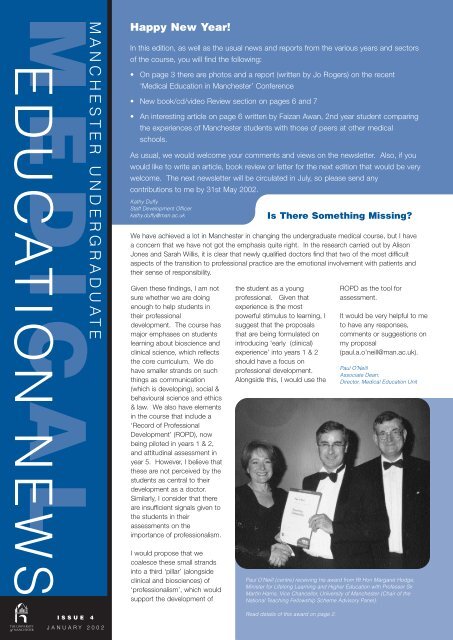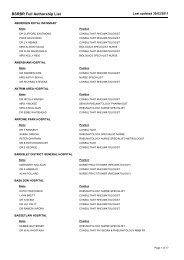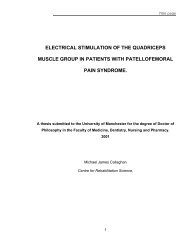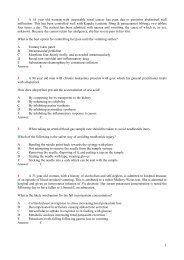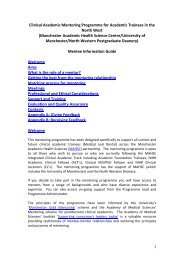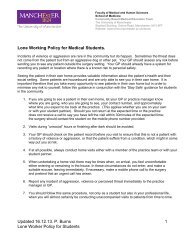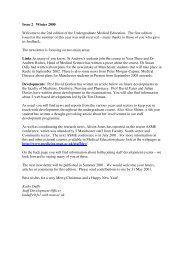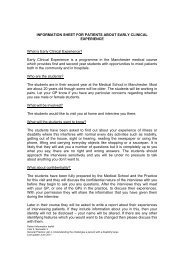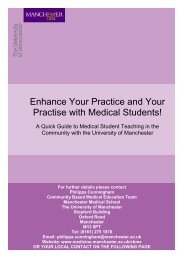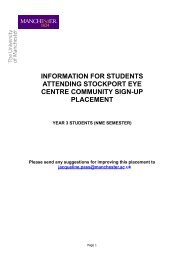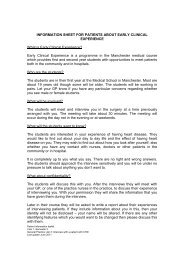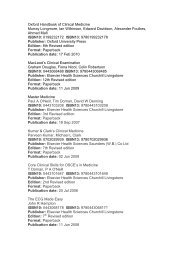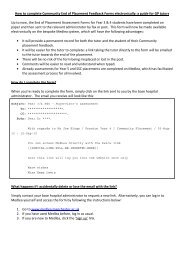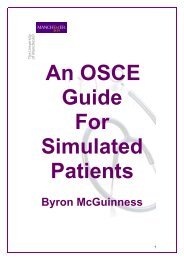8pp nsletter jan 02.2 - School of Medicine - University of Manchester
8pp nsletter jan 02.2 - School of Medicine - University of Manchester
8pp nsletter jan 02.2 - School of Medicine - University of Manchester
- No tags were found...
Create successful ePaper yourself
Turn your PDF publications into a flip-book with our unique Google optimized e-Paper software.
MANCHESTER UNDERGRADUATEMEDICALEDUCATION NEWSHappy New Year!In this edition, as well as the usual news and reports from the various years and sectors<strong>of</strong> the course, you will find the following:• On page 3 there are photos and a report (written by Jo Rogers) on the recent‘Medical Education in <strong>Manchester</strong>’ Conference• New book/cd/video Review section on pages 6 and 7• An interesting article on page 6 written by Faizan Awan, 2nd year student comparingthe experiences <strong>of</strong> <strong>Manchester</strong> students with those <strong>of</strong> peers at other medicalschools.As usual, we would welcome your comments and views on the newsletter. Also, if youwould like to write an article, book review or letter for the next edition that would be verywelcome. The next newsletter will be circulated in July, so please send anycontributions to me by 31st May 2002.Kathy DuffyStaff Development Officerkathy.duffy@man.ac.ukWe have achieved a lot in <strong>Manchester</strong> in changing the undergraduate medical course, but I havea concern that we have not got the emphasis quite right. In the research carried out by AlisonJones and Sarah Willis, it is clear that newly qualified doctors find that two <strong>of</strong> the most difficultaspects <strong>of</strong> the transition to pr<strong>of</strong>essional practice are the emotional involvement with patients andtheir sense <strong>of</strong> responsibility.Given these findings, I am notsure whether we are doingenough to help students intheir pr<strong>of</strong>essionaldevelopment. The course hasmajor emphases on studentslearning about bioscience andclinical science, which reflectsthe core curriculum. We dohave smaller strands on suchthings as communication(which is developing), social &behavioural science and ethics& law. We also have elementsin the course that include a‘Record <strong>of</strong> Pr<strong>of</strong>essionalDevelopment’ (ROPD), nowbeing piloted in years 1 & 2,and attitudinal assessment inyear 5. However, I believe thatthese are not perceived by thestudents as central to theirdevelopment as a doctor.Similarly, I consider that thereare insufficient signals given tothe students in theirassessments on theimportance <strong>of</strong> pr<strong>of</strong>essionalism.I would propose that wecoalesce these small strandsinto a third ‘pillar’ (alongsideclinical and biosciences) <strong>of</strong>‘pr<strong>of</strong>essionalism’, which wouldsupport the development <strong>of</strong>Is There Something Missing?the student as a youngpr<strong>of</strong>essional. Given thatexperience is the mostpowerful stimulus to learning, Isuggest that the proposalsthat are being formulated onintroducing ‘early (clinical)experience’ into years 1 & 2should have a focus onpr<strong>of</strong>essional development.Alongside this, I would use theROPD as the tool forassessment.It would be very helpful to meto have any responses,comments or suggestions onmy proposal(paul.a.o’neill@man.ac.uk).Paul O’NeillAssociate Dean;Director, Medical Education UnitPaul O’Neill (centre) receiving his award from Rt Hon Margaret Hodge,Minister for Lifelong Learning and Higher Education with Pr<strong>of</strong>essor SirMartin Harris, Vice Chancellor, <strong>University</strong> <strong>of</strong> <strong>Manchester</strong> (Chair <strong>of</strong> theNational Teaching Fellowship Scheme Advisory Panel).ISSUE 4Read details <strong>of</strong> this award on page 2.JANUARY 2002
National Teaching & Learning FellowshipAs part <strong>of</strong> the drive to support and improve teaching, the HigherEducation Funding Council (HEFC) have funded teaching and learningfellowships for the last 2 years. These fellowships are awarded inconjunction with the Institute <strong>of</strong> Teaching & Learning (ILT), which wasset up after the Dearing Report to promote the scholarship <strong>of</strong>education.Staff Development News:It was good to see so many colleagues (almost 100 people attended)at the recent Medical Education in <strong>Manchester</strong> Conference inNovember. Evaluation from attendees on the day suggests that itwas a valuable day. Typical comments in answer to ‘what was theone most useful aspect <strong>of</strong> the day?’ were:‘Insight into the whole process <strong>of</strong> course design and theplace within that <strong>of</strong> our own contributions’‘opportunity to stop and appreciate what we do and theresources available’‘networking’‘generally thought provoking and interesting’You will find some photos and a review <strong>of</strong> the day written by JoRogers on the next page. Also on the staff development web pages(www.medicine.man.ac.uk/staffdev) we will shortly be posting morephotos, reports and the speakers’ presentations.Welcome to Andrea Owen, Research Associate, to the MedicalEducation Unit. Andrea will be working on a project funded by thePostgraduate Dept looking at ‘Managing the teaching <strong>of</strong> learners withvarying experience and needs in the clinic environment’. We hopethat the results <strong>of</strong> this project will inform future plans for staffdevelopment to support clinical teachers.As well as the Medical <strong>School</strong> staff development programme (detailson the back page) the following events may be <strong>of</strong> interest to you:10th Ottawa Conference on Medical Education13th -16th July 2002Ottawa, Canadawww.ottawa10th-at-home.orgAssociation for Medical Education in Europe (AMEE)‘Approaches to Better Teaching in the Healthcare Pr<strong>of</strong>essions’29 August - 1 September 2002Lisbon, Portugalwww.amee.orgThe Association for the Study <strong>of</strong> Medical Education (ASME)Annual Meeting 200210th - 12th September 2002Norwichwww.asme.org.uk/meetingsEuropean Association for Communication in Healthcare(EACH)International Conference on Communication in Healthcare18- 20 September 2002Warwick <strong>University</strong>www.each2002.comKathy DuffyStaff Development OfficerEach <strong>University</strong> is allowed to nominate one person for a fellowshipeach year. If shortlisted, the applicant has to submit a project thathe or she would carry out with the funding. Twenty fellowships <strong>of</strong>£50,000 have been awarded each year.My application was based on all that we have achieved in MedicalEducation in <strong>Manchester</strong>. For the project, I have focused on themodel <strong>of</strong> medicine as a model for distributed learning (distance)given that our students are based across a wide geographical areain diverse clinical settings. The challenge is how to support theirlearning whist studying some distance from the <strong>University</strong>. We havealready done a lot <strong>of</strong> work in this area with the help <strong>of</strong> MariaRegan, Vic Lyte (Delta project), Carl Whitehouse, Tim Dornan, LisCordingly and Alison Humphrey. My project is based on selfassessmentusing clinical cases over the Web. The plan is toenable the assessment to be tailored to the competence <strong>of</strong> thestudent (adaptive testing). I will use the money to fund a webdeveloperspost and we are being helped by John Norcini, who isa world expert on assessment and is based at the National Board<strong>of</strong> Medical Examiners in North America.Paul O’Neill, Associate DeanResearch NewsWith the recent departure <strong>of</strong> Alison Jones, Research Associate inMedical Education, to Australia, we have had some newresearchers come to join the team based in Rusholme. Welcometo Stevie Agius and Sam Cooke. Details <strong>of</strong> their projects areincluded below.But first <strong>of</strong> all, an update from Alison Jones:Having completed three years evaluating outcomes <strong>of</strong> thetraditional and new medical curricula at <strong>Manchester</strong>, I am nowworking in the Department <strong>of</strong> General Practice at Adelaide<strong>University</strong> in South Australia. I have two roles in the department -the first is as Curriculum Development Officer. This involves workingwith the staff to plan a long-term strategy for the provision <strong>of</strong>education and training by the department. The second role I havetaken on is as state coordinator for a program aimed at buildingresearch capacity at primary care level. We plan to undertake aneeds assessment and work out ways to meet the needs andremove barriers to participation in research.If anyone is interested in these projects, I would gladly exchangeideas and experiences.My email contact is alison.jones@adelaide.edu.auStevie AgiusI will be joining the Medical Education Unit as a Research Associatein January 2002. I am currently working as the ProjectDevelopment Co-ordinator in the Department <strong>of</strong> Postgraduate<strong>Medicine</strong> & Dentistry, with responsibility for commissioning initiativesthat will blend service commitments with training opportunities. Myresearch will focus on identifying the key elements <strong>of</strong> educationculture within General <strong>Medicine</strong>. The intention is to locate, withinthe wider culture <strong>of</strong> the specialty, attitudes and behaviours towardsteaching/learning and sub-specialisation at Specialist Registrarlevel, with the aim <strong>of</strong> developing the work <strong>of</strong> the postgraduatedeanery.Sam CookeI am working as a Research/ Project Assistant in MedicalEducation. My current projects include an evaluation <strong>of</strong> theacquisition and development <strong>of</strong> diagnostic thinking abilities inmedical undergraduates (with Caroline Boggis); PBL assessmenttool modification (with Chris Bundy); and multipr<strong>of</strong>essional teachingwith midwifery, nursing and medical students (primarily with AnnWakefield and Caroline Boggis).Sarah WillisResearch Associate2
Medical Education in <strong>Manchester</strong>, Wednesday 14th November 2001The prospect <strong>of</strong> study leave which doesn’t involve either the trauma <strong>of</strong>Virgin rail travel or having to spend time in London is always attractive.When I applied for a place at the Medical Education in <strong>Manchester</strong>one day conference I had no specific expectations but rather a vaguehope that it might provide me with an enhanced understanding <strong>of</strong> thecurriculum and the philosophy behind it.My involvement in undergraduate education is mainly as a 3rd yearPBL tutor and supervisor for special study modules in 3rd / 4th year. Ienjoy both immensely but sometimes suffer from insecurity aboutwhether it is effective.Admittedly, by the time the Education day approached, myenthusiasm had waned slightly. A hectic night on call saw me sleepdeprived and I was thinking that the course would need to be verystimulating if it was to stop me nodding <strong>of</strong>f before the first c<strong>of</strong>feebreak. Fortunately, I needn’t have worried- it was and I didn’t. Andmercifully, my secret dread that it would also involve hours <strong>of</strong>educationalists talking over my head about learning models was toprove unfounded.At registration we were asked to sign up for an afternoon workshop.They all looked promising, so I opted for the one that had the mostsignatures, assuming that someone must have inside information.The structure for the day was to be three lectures in the morning withworkshops after lunch followed by a final lecture.The final lecture <strong>of</strong> the morning was entitled ‘How Do We TeachMedical Ethics In An Integrated PBL Curriculum’ and delivered byMark Brennan, a senior lecturer in medical ethics. He managed to beboth thought provoking and humorous and won over most <strong>of</strong> us earlyon with a film clip <strong>of</strong> a Lancelot Spratt ward round. I noticed that thesame chap would be facilitating the workshop I had signed up for andfelt content that it would at least be entertaining.After lunch came the workshops. It was a shame that many <strong>of</strong> theseinvolved a few minutes walk to another venue, as you couldn’t helpfeeling that we ran out <strong>of</strong> time just as things were getting going. Theethics workshop consisted mainly <strong>of</strong> group work centered aroundclinical governance type issues. It worked well and allowed medicaldirector and medical student to contribute in equal measure.The final session <strong>of</strong> the day was taken by Paul O’Neill who informedus about some <strong>of</strong> the work which had been carried out to comparethe traditional curriculum with the reformed. Results so far wouldappear to be promising. Again there was a potential for a much longerdiscussion which time could not allow.The day was well organized, used an effective combination <strong>of</strong> lecturesand workshops, and managed to be relevant to an extremely variedaudience. And I enjoyed it.Jo RogersConsultant in Intensive Care, SMUHTThe first speaker was Albert Scherpbier, Pr<strong>of</strong>essor <strong>of</strong> <strong>Medicine</strong> fromMaastricht. He talked about the further changes to the curriculum inhis medical school- with training in any one medical specialty beingconcentrated into a particular year. His comment that medicalstudents are adults and pr<strong>of</strong>essional colleagues who deserve to betreated with respect was particularly apt and accurate. There was noshortage <strong>of</strong> questions and I was sorry that the discussion time wasnot longer.Following the ubiquitous c<strong>of</strong>fee break was a lecture from Steve Walkerconcentrating on the use <strong>of</strong> information technology in healthcareeducation. I have to confess to being a bit lost at times during thissession but I suspect that the majority <strong>of</strong> the audience had no suchproblem. Again this was expertly presented with ample time allowedfor further discussions.Albert Scherpbier (left) leading discussion during his workshopDiscussion about how to teach medical ethics at Mark Brennan’s workshop3
News from Central sectorThe teaching at Central has been generally very well receivedby the new influx <strong>of</strong> students. The feedback has been verypositive although there remain some problems with attendance.The feedback in the first term was particularly good this timefrom the Barnes firm and from the A&E firm organised by DrRosemary Morton. In general many students felt that more useshould be made <strong>of</strong> the SpRs and other non-consultant staff.The teaching skills lab run by Guy Nambiar has expanded interm <strong>of</strong> activities and facilities. Exam venues have been achallenge which Lesia has solved but attention to thiscontinuing problem will be necessary in the coming year.The new M&M module has produced interesting challenges,which are being addressed and gradually overcome with hardwork and good will. The sign up sessions continue to expandas do the selection <strong>of</strong> SSM's <strong>of</strong>fered, and all new consultantsare being targeted to join the core teachers.The Student common room continues to be improved and twoseparate prayer rooms have now been provided for Muslimstudents on the central site. Jessica and Jo have now joinedthe permanent staff in the undergraduate <strong>of</strong>fice and are hugeassets. Marylyn, Hazel, Lesia, Jo, Jessica and Guy continue toput massive efforts into the continuing education and pastoralcare <strong>of</strong> students well beyond the call <strong>of</strong> duty and the normalworking week.Lawrence Cotter, Hospital Dean, CentralReport from years 1 & 2The arrival <strong>of</strong> 361 Year 1 MBChB students on September17th coincided with thecompletion and handing over<strong>of</strong> the new medical teachingblock that is the StopfordBuilding extension. At astroke, we have 16 identicalrooms in which toaccommodate the groups <strong>of</strong>years 1 and 2 medicalstudents, dental studentsand nursing students, fivedays a week. We saidfarewell to the Portacabins inthe car park that served usso well last year.The new rooms take up to14 students each and, as weget used to them, we shallintroduce extra facilities,including a networked PC. Itmeans that next year whenyears 1 and 2 reach thecurrent target intake we haveno worries about where toput them all. The oneexception is the Stopfordlecture theatre, which is nowoverfull on those occasionswhen all year 1 students turnup! Space pressure is alsobeing felt in the StopfordBuilding library andelsewhere.There have been fewcurriculum changes for thiscurrent academic year. Theone major change is in theexaminations for MB ChBwhere substantial changes tothe examination processesare being brought in. Thepapers themselves aremostly unaltered. Some <strong>of</strong>the changes were driven bycomments from externalexaminers and we will firstsee what impact there is inJanuary. The main purpose isto try to reduce the excessivenumber <strong>of</strong> first and secondyear MB ChB students whohave to resit manyexamination papers inAugust. Also, some <strong>of</strong> thechanges bring years 1 and 2more closely in line withexaminations in years 3 –5.I am grateful to the staff,mostly from BiologicalSciences, who have met withProblem Based Learning firsthand for the first time thisyear by acting as tutor to agroup <strong>of</strong> medical students.Without their help, we wouldhave struggled to cope withthe increased numbers <strong>of</strong>students.Paul SlaterDirector <strong>of</strong> Studies, Years 1 and 2Salford Sector News All Change (once again!)We are pleased to report that at the beginning <strong>of</strong> the New Year, we will have a fullcomplement <strong>of</strong> staff at Hope. Roseanne Seddon is our latest appointment joining us inJanuary as our Departmental secretary. Lorna McInulty, who has been with us onsecondment as the Clinical Skills Facilitator, has been successful in obtaining a ConsultantNurse post at Wigan. A reserved space in the Consultant’s car park at Wigan being one <strong>of</strong>the perks <strong>of</strong> her new job. Lorna has been replaced by Nashaba Ellahi. Nasha joins us fromArrowe Park Hospital where she taught clinical skills to pre and post registration nurses.Beverley Walters is settling into her new role as Year 3 administrator after having spentseveral years in the Human Resources Department at Hope. Finally, congratulations toDeborah Swift (examinations secretary) who successfully ran her first fourth year OSCE andsurvived!Feedback from the first cohort <strong>of</strong> students coming to Hope for Neurosciences teaching hasbeen very positive. We thankDr Wolfgang Schady and his team for all their commitment and hard work in organising thison our behalf.Judy HadfieldBusiness Manager, HopeStop Press:OSCE Examiner TrainingFollowing the well-receivedprogramme <strong>of</strong> examinertraining workshops at thethree teaching hospitals lastyear, we are hoping toorganise some moresessions this spring for newexaminers.We also hope to <strong>of</strong>fer arefresher workshop forexperienced examiners.If you would like moreinformation about thesesessions, please send anemail tokathy.duffy@man.ac.uk4
Community developments.Introducing the new Mind &Movement Module has beena major change for a number<strong>of</strong> our Community providers.As Emyr Benbow explainedin the Summer Newsletterstudents are now required tosee real patients in thecommunity prior to their PBLsessions. Practices neededto be able to identify the rightpatient in advance, to ensurethat students had enoughtime and a suitable place tomeet those patients and tocope with all these demandson a Monday (the busiest day<strong>of</strong> the week for generalpractices) in order to ensurethat students had a completeweek to explore eachproblem. We are verygrateful for their efforts buthow has it gone?We have had feedback fromhalf (45/89) <strong>of</strong> the practicesinvolved. None <strong>of</strong> them ratedthe new module asunsatisfactory, although a fifthwere still neutral. Only tw<strong>of</strong>elt it was not easy to findsuitable patients, although aquarter felt that it was difficultto find suitable patients witha psychosis and nearly asmany had problems with thesubstance abuse andaggression case. Theimpression gained is that thisaspect <strong>of</strong> the module isfeasible. This was supportedby student feedback. 52students commented andnone disagreed with thestatement that the GPpractices usually providedthem with access to suitablepatients, only one felt the GPtutor had not helped themachieve their learning needsand only two disagreed withthe statement that thecommunity experiencecomplemented their otherlearning opportunities.However it was alsonoticeable from the practicefeedback that very fewstudents were taking theopportunity to revisit thepatients the following week,and perhaps review theirfindings after the PBLsessions. Also comparativelyfew students were taking theopportunity to meet up withother relevant members <strong>of</strong>the community team such astherapists, mental healthteam or pharmacists.Although all except sixpractices reported access tothe Internet, most studentswere not using that facility(and indeed only four <strong>of</strong>students reported using it toaccess the MMM website). Itseems that, as yet, the use <strong>of</strong>practice resources for bothdistributed learning and forexploring some <strong>of</strong> the wideraspects <strong>of</strong> care <strong>of</strong> chronicillness has not yet taken <strong>of</strong>f.There is still a long way to goto ensure that this resource,where students should bespending a fifth <strong>of</strong> their time,is used to the bestadvantage.Carl WhitehousePr<strong>of</strong>essor <strong>of</strong> Teaching <strong>Medicine</strong> inthe CommunityNews from South <strong>Manchester</strong>:In South Sector we havebeen undergoing a lot <strong>of</strong>change in recent months.Firstly, we welcome two newmembers to the team. DrMark Holland has beenappointed as Hospital Tutorwith particular responsibilityfor Year 5. Aine McVanemyhas joined us from Theatresand Recovery as a ClinicalSkills Tutor.In addition to our new staff,we have moved into ourfacilities in the Education &Research Centre atWythenshawe. The ClinicalSkills Unit and PathologyTeaching is now adjacent toTrust Training, the academic<strong>of</strong>fices and many otherdepartments. We anticipatemany benefits from this closeproximity. The students havealready been a topic <strong>of</strong>conversation <strong>of</strong> those nottraditionally involved in theireducation and I havereceived compliments ontheir behalf.The new Clinical Skills Unitdesign has developed fromthe original unit atWithington. We now have theopportunity to set up andleave practice skills stationsfor open access for thestudents. The unit alsoincludes purpose-builtcommunications rooms, 2tutorial rooms and acomputer room. We aregetting used to the newaccommodation, althoughthere is still some unpackingto do. We are very excitedabout the facilities and hopeto take full advantage <strong>of</strong>them over the next year.The Trust policy is for theEducation & Research Centreto integrate all educationactivities. The building has acentral atrium which isproving to be a focus formeeting colleagues,networking and integration oall staff. The c<strong>of</strong>fee bar wassoon very busy.Caroline Boggis,Hospital Dean, SMUHTThe new clinical skills unit in use during the Meet the Tutors afternoon5
News From Postgraduate EducationIt is with considerable pleasure that I am writing a short articlefor Undergraduate Education News. Although there has alwaysbeen close co-operation between the Medical <strong>School</strong> and thePostgraduate Dean’s Department, there are now, I believe, evencloser links than before.The <strong>University</strong> has agreed to appoint a senior lecturer inMedical Education and indeed, it is hoped that we will be ableto recruit to this post in the New Year. We are keen that thisperson can develop a Certificate, Diploma and even a Mastersin Medical Education, which would help to raise the pr<strong>of</strong>ile <strong>of</strong>medical education throughout the undergraduate andpostgraduate arena.We are also working closely with the Medical <strong>School</strong> on severalresearch projects. Not only do we hope that these produceeducational degrees for those who are undertaking theresearch, but also that they will investigate some <strong>of</strong> the verychallenging areas in medical education.Finally, there has been considerable change in the way thatmedical service education is being viewed by the NHS. FromApril, the budget for postgraduate medical and dentaleducation (MADEL) and probably SIFT, will all be held withNMET (Non Medical and Education and Training Monies) andadministered by work force development confederations. Thisis an exciting opportunity for the NHS not only to plan and trainit’s workforce more efficiently, but also for multi-pr<strong>of</strong>essionaltraining and multi-skilling being given a much higher priority.Dr Richard FeinmannDeputy Dean <strong>of</strong> Postgraduate Medical StudiesThe View From BelowMany <strong>of</strong> my friends are studying medicine in other universitiesacross the country. When they return to <strong>Manchester</strong>, they tellme stories about monotonous lecture-filled days, uninspiringprosections, mind-numbing laboratory sessions and worst <strong>of</strong> all,nine-o’clock starts. When I tell them about the medical courseat <strong>Manchester</strong>, many believe I’m pulling their leg. Theysubconsciously drool when I tell them about my single nineo’clockstart, our (occasionally) inspirational six hours <strong>of</strong> lecturesa week, our hands-on dissections, our excellent laboratory staff,the book-filled library, ample computers, riveting SSM topicsand most importantly our approachable tutors, demonstratorsand teaching staff. The only problems we face are that we onlyfind out about our lectures a week in advance and that thereare not enough practise papers for the new MCQ examinations.The differences between the teaching methods are made mostapparent when we begin discussing random "patients" we seeon the street. "Oh, look! There’s an old lady with an abnormalgait," one <strong>of</strong> us notes. Listening to them recall their medicalknowledge is an experience in itself. Often, I feel like pressingthe stop-button on the tape recorder they’ve hidden in theirmouths. But when it comes to hypothesising, they have noidea.This is where PBL saves the day. Using the scientificknowledge that <strong>Manchester</strong> students have, we can come upwith a tentative explanation <strong>of</strong> why the "patient" has a certaintype <strong>of</strong> gait (Case-based paper). Through our training with thePublication-based paper, we can speak precisely and in laytermsdepending on the circumstances. Worryingly enough, wecan even formulate speculative treatment options. To them,medicine is about being pumped full <strong>of</strong> knowledge only toregurgitate it for end-<strong>of</strong>-semester exams. <strong>Manchester</strong> students,on the other hand, are learning how to think, assimilate, applyand share the knowledge they themselves believe they require.This process <strong>of</strong> learning is far more effective.For pro<strong>of</strong> <strong>of</strong> this success, just look at the way the students inthe third semester are already beginning to actively employevidence-based learning in their SSM’s. Contact with patientshas been made, communication skills have been employed,data has been recorded, gaps in understanding have beenfilled, and soon, their findings will be presented in front <strong>of</strong> anaudience <strong>of</strong> their peers. All <strong>of</strong> this has been done at thestudents’ own initiative.PBL is working, and it is working well at <strong>Manchester</strong>. The factthat I’m praising my own course should be pro<strong>of</strong> enough.Faizan Awan, 2nd year medical studentBOOK REVIEWField Guide to the Difficult Patient InterviewAuthors: Frederic W. Platt & Ge<strong>of</strong>frey H. Gordon, 1999Publishers: Lippincott, Williams & WilkinsISBN 0 - 7817 - 2044 - 3This is a small paperback reference guide, which is practical and easy to dip into. The layout is the samefor each section: • an introduction to a problem• description <strong>of</strong> the principles for an effective approach• procedures for dealing with the problem• a list <strong>of</strong> pitfalls to be avoided• a take-away pearl <strong>of</strong> guidanceIt can be read in one go, used to prepare for an anticipated difficult situation or to reflect on anunanticipated one. There are sections on a wide range <strong>of</strong> problems including- dealing with anger,breaking bad news and somatisation. Each section is well referenced. Although the authors areAmerican their advice and the situations they describe successfully cross the potential communicationbarriers. I like the practical up-to-date approach and their clear section titles appeal to me e.g. try thesection ‘ The Patient Bearing Literature’.I recommended this to buy and keep handy as a support for any clinician.Reviewer: Rosie Illingworth, Lecturer in Communication6
CD ROM REVIEWClearly Evident – August 2000Clearly Evident is aninteractive CD-romdeveloped incollaboration betweenthe Training & DesignGroup at the <strong>University</strong><strong>of</strong> Birmingham and apanel <strong>of</strong> health librariansin the West Midlands. Itis a self-learning tooldesigned to help usersgain transferableinformation skills neededfor database searching.Users follow junior doctorMaddy, who is asked by herConsultant to perform asearch on the best approachfor stroke rehabilitation. Maddyis taken through four differentmodules covering the keystages <strong>of</strong> a search including:1. Planning- (key stepsrequired to complete asuccessful search)2. Doing – (steps involved inan online search)3. Reviewing – (assessing andadapting the searchaccordingly)4. Developing – (usingtechniques to create a morefocused search)The CD has been producedusing a clear, simple approachwith an excellent userinterface.Medline databasesand the OVID search engineare used to demonstrate thevarious steps involved inconducting a search. Althoughthe ‘Help’ button on the CDonly applies to accessinginformation on the screen,there is a useful Quizmaster oncompletion <strong>of</strong> the CD to checkthe knowledge and skills youhave learnt.At the end <strong>of</strong> Clearly Evidentusers should be competent tobuild a simple search strategy,using a range <strong>of</strong> features suchas Boolean operators, searchfilters and field limits. Althoughprimarily aimed at medicalstudents using Medline, theskills and knowledge includedin the CD would be useful toanyone who needed help withsearching strategies.Contact for copies:Rachel WhittlestoneLibrary UnitThe Public Health Building<strong>University</strong> <strong>of</strong> BirminghamEdgbastonBirminghamB15 2TTTel: 0121 414 7857Fax: 0121 414 7855Email: rachelw@hsrc.org.ukReviewer: Maria ReganIT Research Associate, MEUDistributed Learning within the existing M.B. Ch.B. programmeWe have now completed Phase One <strong>of</strong> the Distributed Learning(DL) project initiated to develop a distributed learningenvironment to support Year 4 and 5 students during theircommunity placements. The project includes a sample <strong>of</strong> eightdistrict general hospitals (DGHs) and twenty general practiceslocated throughout the region. It is anticipated that theestablishment <strong>of</strong> a distributed learning environment within theseplacements will provide students with greater clarity about theiranticipated learning outcomes; more equal and effective accessto learning resources; improved support and clearer assessmentand improved academic direction and support.Work has concentrated mainly on developing initial Mind &Movement Module content and internet-based resources,determining availability, access and appropriateness <strong>of</strong> studentuse <strong>of</strong> IT resources, and conducting training activities withstudents, support staff and undergraduate tutors. Members <strong>of</strong>the Delta and Distributed Learning teams within the <strong>University</strong>have helped prepare the technical, component and supportstructures required for the DL environment.The main area for access to the DL resources has beenobtained in the Education Centre Libraries within the selectedgroup <strong>of</strong> DGHs. Training for administrative staff and clinicaltutors at the hospitals and placements has enabled them t<strong>of</strong>acilitate student use <strong>of</strong> the DL resources. Orientation sessionshave been conducted with Year 4 students before theircommunity placements in September and January. In turn,students are now aware and able to use the IT facilities and DLprogrammes available and tutors and administrators are moreconfident in providing support to students in use <strong>of</strong> the DLresources.Phase Two <strong>of</strong> the project includes development <strong>of</strong> interactiveonline resource packs for Year 5, a central support infrastructureto respond to student needs and electronic monitoring <strong>of</strong>student progress with feedback. Workshops are also planned inMarch 2002 for developers in Faculty to share tools andexperiences in making content submission easier for cliniciansand academics and making the submission process easier forUG tutors in both the Sector and DGH sites.Phase One has provided us with a broad awareness andsupport across the NHS sector for a DL environment. We nowhave a better contextual understanding <strong>of</strong> the NHS-orientatedDL environment for the requirements in the next stage <strong>of</strong> theproject. Experience from Phase One will also inform the roll-outprogramme to Year 3 students, other remote sites and Keele<strong>University</strong> for the Academic Year 2002/3.For more information on this project please contactMaria Regan, 0161 256 3015 Ext 270,email: maria.regan@man.ac.uk7
MANCHESTER MEDICAL SCHOOL Programme <strong>of</strong> Staff Development Workshops January 2002 - September 2002All workshops are free <strong>of</strong> charge and open to all staff involved in teaching <strong>Manchester</strong> medical undergraduates.All workshops will be held at Rusholme Health Centre unless otherwise indicated.For additions/changes to the programme please check the website at: www.medicine.man.ac.uk/staffdevPlaces are limited: booking is essential. To book a place please complete the enclosed reply sheet or contact Kathy Duffy at kathy.duffy@man.ac.ukTitle/ Description Date /Time Workshop leaderIntroduction to PBL : How to be a PBL tutorAimed at new PBL tutors this will cover the cycle <strong>of</strong> problem-based learning in <strong>Manchester</strong>and the role <strong>of</strong> the PBL tutor. There will be opportunity to observe a student PBL group.PBL RefresherAimed at tutors with at least 6 months <strong>of</strong> PBL experience.There will be opportunity to discuss common difficulties encounteredas a PBL tutor and explore ways to address them.The role <strong>of</strong> the tutor during the 2nd group meeting will be explored. This workshop shouldhelp participants to have a clearer understanding <strong>of</strong> the role <strong>of</strong> the PBL tutor and how to helpa PBL group function more effectively.Teaching undergraduates at the bedside and in the clinic environmentThere will be discussion <strong>of</strong> the principles <strong>of</strong> teaching with patients at the bedside and in clinic.Participants will have the opportunity to put these principles in practice.Year 5 tutoring and group facilitation skillsThere will be discussion <strong>of</strong> the overall aims and objectives <strong>of</strong> Year 5 <strong>of</strong> the course and the role<strong>of</strong> the tutor. The participants will have the opportunity to practice and discuss the process <strong>of</strong>appraisal and assessment <strong>of</strong> a student's progress and how to give advice on furtherdevelopment <strong>of</strong> skills and attitudes in Year 5 modules.General Teaching skillsThere will be discussion <strong>of</strong> the principles <strong>of</strong> adult learning and ways <strong>of</strong> putting them intopractice. Participants will have the opportunity to practice their own teaching skills and exploreways to improve their teaching. The importance <strong>of</strong> evaluation in learning will be discussed.Thursday 31 January 200209.30-16.30Friday 19 April 200209.30-16.30Thursday 27 June 200209.30-16.30Friday 20 September 200209.30-16.30Thursday 2 May 200209.30-16.30Please note change <strong>of</strong> dateThursday 28 February 200213.30 – 17.00Clinical Skills Unit,Education & Research Centre,Wythenshawe HospitalFriday 21 June 200209.30-16.30Friday 24 May 200209.30-13.00Pr<strong>of</strong> Paul O'NeillMs Kathy DuffyPr<strong>of</strong> Paul O'NeillMs Kathy DuffyPr<strong>of</strong> Paul O'NeillMs Kathy DuffyPr<strong>of</strong> Paul O'NeillMs Kathy DuffyPr<strong>of</strong> Paul O'NeillDr Leena PatelMs Kathy DuffyPr<strong>of</strong> Paul O'NeillDr Ged ByrnePr<strong>of</strong> Carl WhitehousePr<strong>of</strong> Paul O'NeillMs Kathy DuffyFully BookedPresentation SkillsA practical session looking at ways to improve presentation skills, including using power pointeffectively, making seminars more interactive.Thursday 7 February 200209.30 – 13.00Pr<strong>of</strong> Paul O'NeillDr Richard WhitehouseFacilitating active learning in small groupsAims to build on participants’ interpersonal skills so they can help a group <strong>of</strong> peers or learnerswork cohesively and productively in a group.Neurolinguistic programmingDay 2: ‘Words and how we use them’This forms part <strong>of</strong> the 4 day series, but can also be attended as a stand alone sessionNeurolinguistic programmingDay 3: ‘Knowing what you want – and getting it’This forms part <strong>of</strong> the 4 day series, but can also be attended as a stand alone sessionNeurolinguistic programmingDay 4: ‘Certificate in Neurolinguistic Programming-completion day’This day is only open to those who have completed the previous 3 days in this series and whowish to complete the certificate.Developing skills for teaching undergraduates communicationParticipants will consider various aspects <strong>of</strong> teaching communication skills. There will be theopportunity to practice teaching communication skills to students including facilitating groupwork/ giving feedback to learners/ using simulated patients (SPs)/ using role-play / 1: 1teaching.Breaking Bad NewsThis is a shortened version <strong>of</strong> what we deliver to the undergraduates in their 4th year. Comeand be introduced to the SPIKES framework and practice your skills in a safe learningenvironment using simulated patients. 24 places are on <strong>of</strong>fer and the interactive developmentwill be in three groups <strong>of</strong> eight. This is a two session course, with a week between sessions.Patient centred consultationsWhat does this mean and how is it put into practice? This course looks at definitions <strong>of</strong>patient-centred then takes a framework and applies it. Simulated patients will be used withself-assessment and feedback. The course will be highly interactive and places will be limitedto 10. Please apply only if you can commit to the three sessions. There will be the opportunityfor analysis <strong>of</strong> videotape <strong>of</strong> participants interviewing.Friday 8 March 200209.30 – 16.30Wednesday 27 February 200209.30 – 16.30Thursday 18 April 200209.30 – 16.30Tuesday 2 July 200209.30 – 16.30Venue: TBAWednesday 20 March 200209.30 – 16.30Two session course:Friday 10 May 2002 andFriday 17 May 200209.30 – 12.30Three session course:Wednesdays:July 10 2002 andJuly 17 2002 andJuly 24 200213.30 – 16.30Ms Rosie IllingworthMs Kathy DuffyDr Maire ShellyDr Maire ShellyDr Maire ShellyMs Rosie IllingworthMs Rosie IllingworthMs Rosie Illingworth8


